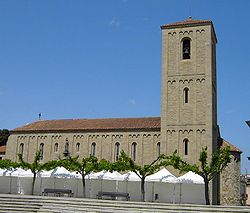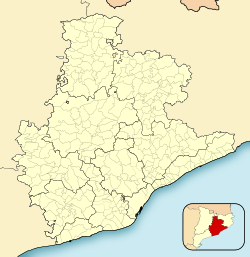Parets del Vallès
| Parets del Vallès | |||
|---|---|---|---|
| Municipality | |||

Sant Esteve's church in Parets del Vallès
|
|||
|
|||
| Location in Catalonia | |||
| Coordinates: 41°35′02″N 2°14′20″E / 41.584°N 2.239°ECoordinates: 41°35′02″N 2°14′20″E / 41.584°N 2.239°E | |||
| Country |
|
||
| Community |
|
||
| Province |
|
||
| Comarca | Vallès Oriental | ||
| Government | |||
| • Mayor | Sergi Mingote Moreno (2015) | ||
| Area | |||
| • Total | 9.1 km2 (3.5 sq mi) | ||
| Population (2014) | |||
| • Total | 18,733 | ||
| • Density | 2,100/km2 (5,300/sq mi) | ||
| Website | parets |
||
Parets del Vallès is a municipality situated 23 km north of Barcelona, in Catalonia, Spain, in the south-west of the comarca of Vallès Oriental, and 7 km from its capital Granollers. It covers an area of 8,98 km², and has approx. 16,000 inhabitants. From north to south, the town is crossed by the Tenes river. The population is spread over 6 areas: Barri Antic (Catalan for "old quarter"), on top of the hill surrounding the church; Eixample ("extension"), the most densely populated, laid out in the 1930s; Escorxador ("slaughterhouse"); Can Cerdanet; Can Volart; and Can Riera (these last three named after the farms in those areas). The municipality includes a small exclave to the north-west.
The first documented reference to this town is from the year 878, but the first time the name Parets was used was in 904 (vila Parietes). The modern place name comes from the 12th century, probably due to some ancient walls of Roman origin found nearby. ("Parets" means "walls" in Catalan.)
Parets was under the direct jurisdiction of the King (Peter IV of Aragon), except for a brief period in 1383 when the Infante John (later John I of Aragon) sold it to Marc de Planella. The jurisdiction was returned to the King in 1385 by the wife of Bernat Planella. To prevent this from happening again, Parets was officially made a street of Barcelona in 1386.
As of 1385, Parets, Mollet and Gallecs were part of the same municipality. Parets became independent from the rest in the mid-19th century. The town has seen good and bad times during its thousand-year history: the dark times of the 14th and 15th centuries, the small increase in population during the 17th century, or the thriving 18th century. However, in that same century, in 1706, the troops of King Philip V of Spain burnt down the parish church, and with it the town archive of Parets. This is why much of the town's earlier history is unknown.
...
Wikipedia




